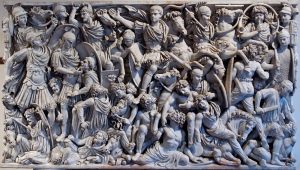The Battle of Abritus took place in AD 251, near modern-day Razgrad. In ancient times, this region in northeastern Bulgaria was a Roman province called Moesia Inferior. Despite being a Roman territory, this is where one of Rome’s worst military disasters took place. The empire not only suffered a devastating defeat, but two of its emperors were killed by the enemy, a first in the empire’s history.
The Battleground
Historians used to estimate the location of Abritus as being 1 kilometer east of Razgrad, based on archaeological work done in the late 1960s and early 1970s. Today, archaeologists know the battle was fought 15 kilometers northwest of Razgrad, down the valley of the Beli Lom River. Discovered on the site were numerous swords, spears, Roman coins, shields, and even tent poles used by the Roman army.
Cause of the Conflict
When Decius deposed Philip the Arab in 249, barbarians plundered the Roman territory of Dacia, which is now present-day Transylvania and Oltenia, and Moesia, which covers modern-day Serbia and Kosovo. During Philip the Arab’s reign, he was supposed to pay the invaders a yearly sum as a bribe to make them stay away from Roman lands. Philip did not keep his part of the agreement, thus the incursions.
The following year, the Gothic chief Cniva commanded his chieftains to lead a combined force of 20,000 Goths and Scythians across the Danubian border. These troops tried to capture Marcianopolis, the Roman capital city of Moesia Inferior, but they failed. Meanwhile, Cniva and his main force of 70,000 men also crossed the Danube, proceeding to the Roman fortress of Novae. Unfortunately for him, his offense was foiled by the governor, Trebonianus Gallus, who would later be emperor. Following this defeat, the invaders rushed towards Nicopolis ad Istrum, intending to ransack the Roman town, but Decius’ troops overpowered them.
The barbarians escaped towards Haemus mountain, but Decius and his troops chased them, probably worried that the barbarians might head to Philippopolis and ransack it. When the Romans had to rest at Beroe in modern-day Bulgaria, the barbarians hurled a surprise attack. A fight ensued, but the element of surprise resulted in the Romans’ defeat. They were forced to march away from the site, and Cniva and his men eventually ransacked Philippopolis. After plundering a massive amount of treasure and Roman captives, Cniva’s troops went back home.
After this defeat, Decius had no other thing in mind except vengeance and taking back the loot. He formed an army composed of 80,000 men, including his son and co-emperor, Herennius Etruscus, and the general Trebonianus Gallus.
The Battle
In the middle of AD 251, in Abritus, Decius and his army stood face-to-face with King Cniva and his combined Gothic and Scythian troops. The size of the opposing armies is not known. What is known is that Cniva seemed to know the terrain well. With this knowledge, he divided his troops into three parts and ordered one part to hide behind a swamp.
According to historians Jordanes and Sextus Victor, Etruscus was ordering his men to make aggressive advances when an arrow killed him. This happened early in the fighting, and when soldiers tried to console Decius over the death of his son, he reportedly said, “Let no one mourn. The death of one soldier is not a great loss to the Republic”.
Decius and his men continued with the fighting and even managed to gain momentum at the frontlines. However, the tide of the battle shifted when Cniva ordered his troops to pull back and retreat towards a swampy area. Decius fell for the trap and ordered his men to chase the withdrawing enemy troops. The Romans continued the chase until they found themselves trudging in the swamp, at which point, Cniva’s troops, who were hiding behind the swamp, sprang on them. Spears rained down on the trapped Romans, killing many of them. It is possible that when most Romans were dead, the barbarians jumped into the swamp and stabbed and slashed the dying. Thousands of liters of Roman blood flowed and mixed with the murky water of the swamp as the battle turned out to be a disaster for the Roman Empire. Decius was killed in the carnage, and his body was never recovered, nor was his son’s.
A Byzantine historian named Zosimus records the slaughter: “Proceeding therefore incautiously in an unknown place, he and his army became entangled in the mire, and under that disadvantage were so assailed by the missiles of the Barbarians, that not one of them escaped with life. Thus ended the life of the excellent emperor Decius.”
The Goths claimed Decius’ chest of gold coins, which weighed tons, along with Roman weaponry and gear.
An Empire Reeling from a Humiliating Defeat
When news of the defeat reached Rome, rumors spread that Trebonianus Gallus might have conspired with the enemy. However, the possibility that this actually happened seems minimal. It runs counter to human psychology that a suspected traitor was even proclaimed emperor by the devastated Roman army.
Gallus went on to sign a peace agreement with the Goths, permitting them to keep the plundered treasures. The agreement also required him to make yearly payments to the Goths to keep them away from the empire’s borders.
